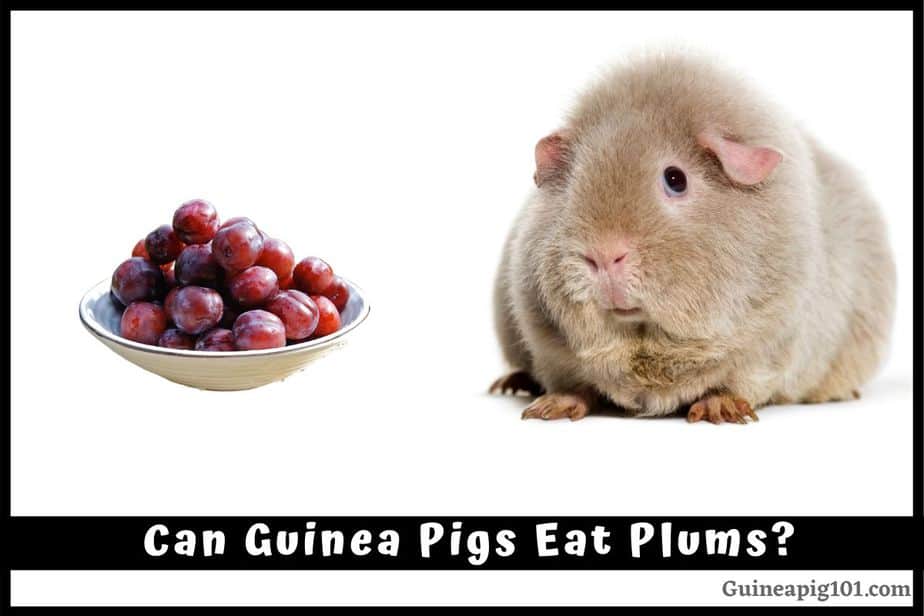Plums are both mouth-watering and refreshing fruit, but plums also provide many nutritional and health benefits. Plums are impressively high in nutrients. But can we share a plum with our guinea pigs? Can guinea pigs eat plums? Is it safe for them?
I did some research and here is what I have learned.
Guinea pigs can eat plums as it is an excellent source of different vitamins and minerals. But it also contains a good amount of sugar, which is unhealthy for our guinea pigs if given in excess. So we must only serve a small number of plums to our guinea pigs.
Fruits are a necessary part of the guinea pig’s diet. Fruits are a good source of nutrients needed by our guinea pigs.
If you can include healthy fruits in your guinea pig’s diet, it will not only keep them healthy but cheerful and happy as well.
Now we know that our guinea pigs can eat plums, you might be wondering if it can harm them in any way. Also, how much plum can they have?
How often can guinea pigs eat plums?
It is recommended not to serve plum as regular food for our guinea pigs.
We can serve plums 2-3 times a week to our guinea pigs but in an adequate amount.
Plums contain a good amount of sugar in it, so serving in excess quantity can be a terrible idea as the guinea pig’s digestive system did not evolve to digest high sugary food well.
How much serving of plum can guinea pigs eat?
Plums are more like a treat for our guinea pigs. You can give one plum to your guinea pig twice or thrice a week.
The pit of the plum should always be removed, as it contains cyanide and can harm them.
Wash the plum thoroughly and do not remove the plum’s skin as most of the antioxidants are present in it.
Are guinea pigs allowed plums?
Yes, you can feed plums to your guinea pigs, but it is beneficial only if given in moderation.
Few common health concerns to look out while feeding plums to your guinea pigs:
- Indigestion/stomach ache: Plums contain a large amount of sugar, and serving it regularly may upset our guinea pig’s stomach. Guinea pigs have fragile stomachs, so it is quite hard for them to digest sugar, and they might get cramps too.
- Diabetes: It is a prevalent health issue among guinea pigs. If we feed them food rich in sugar and carbohydrates regularly, they might have diabetes and other related health issues.
- Formation of calcium stone: Plums contain the right amount of oxalates, which can lead to the creation of dangerous calcium stones, and once they are formed, it can cause a lot of pain to our guinea pigs.
Is plum good for our guinea pigs?
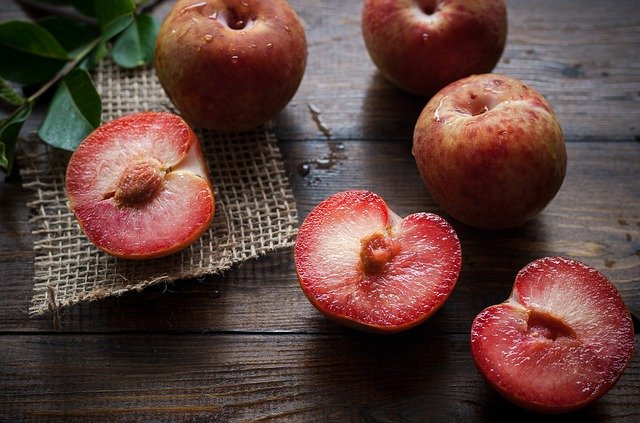
Yes, plum is safe for our guinea pigs if given in a moderate amount.
It holds an excellent nutrient value needed by our guinea pigs.
Plum does contain some amount of Vitamin C, Vitamin A, and other vitamins in it.
These vitamins are essential in a guinea pig’s diet as guinea pigs cannot produce their vitamin and need supplements of the same in their food.
Here are some benefits of feeding plum to our guinea pigs:
- Boost Immune System: Plum is a powerhouse of vitamin C, vitamin A, vitamin K, and other essential vitamins, and can be a great supplement to the guinea pigs.
- It is renowned for its beneficial effects on immune health. The deficiency of vitamin C in the body results in decreased immune function and increased inflammation.
- Rich in antioxidants: Plums are rich in antioxidants, which are useful in reducing inflammation and protecting cells from damage by free radicals.
- They are high in polyphenol antioxidants, which have positive effects on bone health and help to reduce the risk of diabetes.
- Reduce heart diseases: Consuming plums regularly may have a protective effect on heart health. They have the potential to reduce high blood pressure and cholesterol levels, significant factors for heart-related diseases.
- Rich In Fiber: Plums hold the right amount of fiber in it. Raw plums contain approx two grams of fiber per fruit. Research has found that diets rich in fiber helps to lower the risk of colorectal cancer.
Nutrition in plums
Plums are a rich source of different vitamins and minerals, in addition to fiber and antioxidants.
However, some of the essential nutrients are as follows:
- Calcium: Plums hold the right amount of calcium in it. Calcium acts as a fuel for the proper functioning of the body. It is a mineral that is necessary for the formation of bones and tissues in the body.
- Rich in Antioxidants: Antioxidants present in plums help to improve the immune system, and a healthy immune system can lower the risk of heart disease, cancer, and other chronic diseases. Plum is a good source of antioxidants.
- Vitamin C: Plums are a rich source of Vitamin C. It, also known as ascorbic acid, is necessary for improving the immune system and helps in growth, development, and repairing of the body tissues.
- Vitamin A: Plums contain vitamin A, which helps to improve the growth and development of the body. It can lower down the risk of certain diseases such as cancer.
- Potassium: Plums contain potassium, which is one of the essential minerals in the body. A diet that contains potassium helps to maintain water retention capacity and reduces blood sugar levels.
Can guinea pigs eat canned plum?
The canned plum is generally processed, and a lot of their natural nutrients have been taken away.
They have additives such as salt and other preservatives as well.
Even if you want to feed them canned plums, then go with those who are low in additives.
Can guinea pigs eat frozen plum?
Guinea pigs should not be fed anything frozen. Generally, frozen food gets too cold and hard, and it becomes difficult for them to chew.
Also, it can lead to stomach upset in guinea pigs.
Even though they can be feed once the fruit is defrosted, but feeding them fresh plums will be more beneficial.
Can guinea pigs eat plum puree?
Yes, guinea pigs can have plum puree but without any additive sugar. Commercial puree should be avoided entirely.
You can wash the plum, remove the skin and the pit, then mash it or make a paste.
But don’t freeze the puree as it gets too cold and becomes hard for them to digest.
Can guinea pigs eat plum jam?
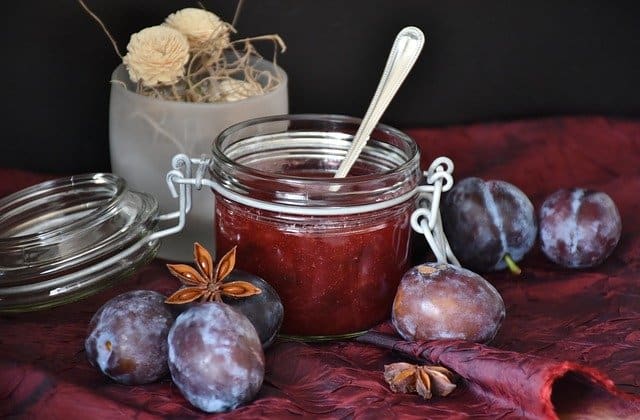
No, the jam is a processed food that is highly unsuitable for our guinea pigs to eat.
Jam is too sweet, sugary, and unnatural for guinea pigs.
They can not digest processed foods well, and as a result, they might get cramps and may suffer from indigestion.
Can guinea pig eat plum tree branches?
No, some tree branches are toxic for our guinea pigs, and plum is one of them.
Plum trees bear fruits that have large pits or stones which are unsafe for our guinea pigs.
If you want to learn more about what are safe tree branches for your guinea pig you can read our article on the topic.
Can guinea pig eat plum tree leaves?
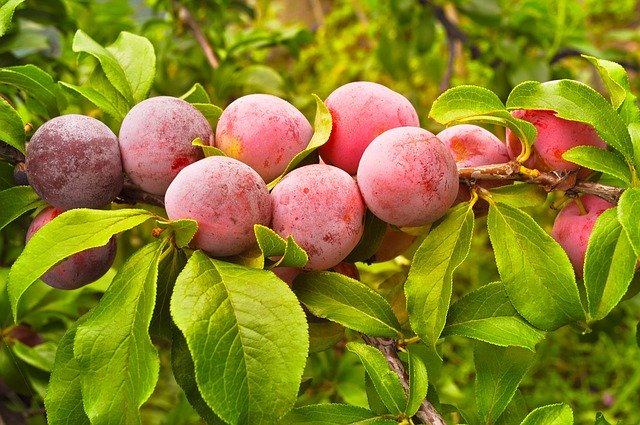
No, guinea pigs can’t eat plum tree leaves as they contain cyanide and therefore are very toxic for them.
Can guinea pigs eat black plums?
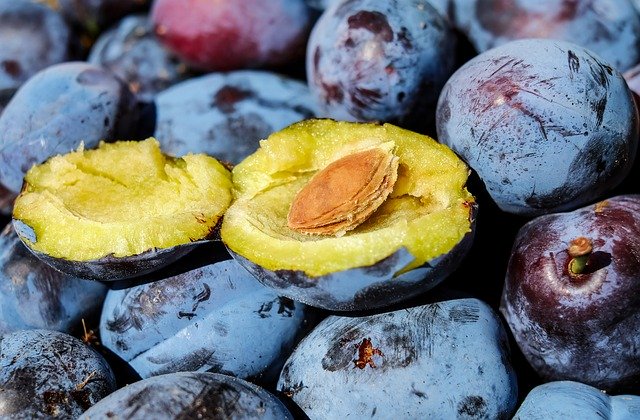
You can serve black plum once or twice a week to our guinea pigs, but in a moderate amount.
Black plums contain antioxidants and might be useful as preventive agents in the pathogenesis of diseases and have similar benefits as regular plum.
Can guinea pigs eat prunes?
Prunes are high in calories and sugar. A few prunes will not harm our guinea pig, but feeding them in high quantities can be very harmful.
It is recommended not to feed guinea pigs prunes as it has high sugar in it may lead to various health hazards.
How to prepare plums for our guinea pigs?
There are a few steps we should consider before preparing plum for your guinea pigs-
- Pick fresh plums for your guinea pig and wash it properly to clean all the surface dirt and must make sure that the plums are clean.
- Remove the plum’s pit, as it contains cyanide and can cause the guinea pig to choke.
- The skin of the plum should be kept on as most of the antioxidants are present in the skin.
- It would be better if you cut the plums in small pieces so that our guinea pigs don’t face any problems while having them.
- And at last, don’t forget to remove the leftovers.
Conclusion: Guinea pigs and Plums
- Plums are a rich source of different vitamins and minerals, in addition to fiber and antioxidants.
- Can Guinea Pigs Eat Plums? Yes, guinea pigs can eat plums.
- It would be best if you only serve a small quantity at a time. Excess serving can be a terrible idea.
- Always remove the pit of the plum, as it contains cyanide and can cause the guinea pig to choke.
- Please don’t feed your guinea pigs leaves and branches of the plum tree as it is very toxic for them.
Sources: Diabetes in guinea pigs, Plums Benefits, Nutrition in Plums, Health benefits of Plums, Diet Composition and Mineral Balance in Guinea Pigs, Dietary Vitamin C, and Vitamin E on Guinea Pig Immune Responses to Mitogens, Vitamin C requirements of the guinea-pig, Is Your Guinea Pig’s Diet Providing the Right Nutrients? Care of Guinea Pigs.
